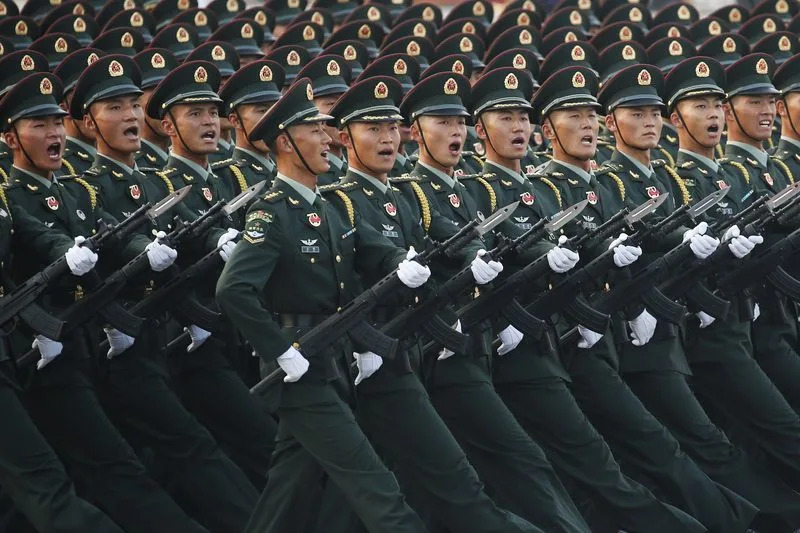China drops 'peaceful reunification' reference to Taiwan; raises defence spending by 7.2%

China will boost its defence spending by 7.2% this year, fuelling a military budget that has more than doubled under Xi Jinping's decade-plus in office as Beijing hardens its stance on Taiwan, according to official reports on Tuesday.
The increase mirrors the rate presented in last year's budget and comes in above the government's economic growth forecast for this year.
China also officially adopted tougher language against Taiwan as it released the budget figures, dropping the mention of "peaceful reunification" in a government work report delivered by Premier Li Qiang at the opening of the National People's Congress (NPC), China's rubber-stamp parliament, on Tuesday.
Tensions have risen sharply in recent years over Taiwan, the democratically ruled island that China claims as its own.
Li Mingjiang, a defence scholar at the Rajaratnam School of International Studies in Singapore, said that despite a struggling Chinese economy, Taiwan is a major consideration for Beijing's defence spending.
"China is showing that in the coming decade it wants to grow its military to the point where it is prepared to win a war if it has no choice but to fight one," Li said.
Since Xi Jinping became president and commander-in-chief more than a decade ago, the defence budget has ballooned to 1.67 trillion yuan ($230.60 billion) this year from 720 billion yuan in 2013.
The percentage rise in military spending has consistently outpaced the annual domestic economic growth target during his time in office; this year the growth target for 2024 is about 5%, similar to last year's goal, according to the government work report.
The defence budget is closely watched by China's neighbours and the United States, who are wary of Beijing's strategic intentions and the development of its armed forces.
The purchase of new equipment is likely to take up the largest single chunk of the budget as the military works to meet Xi's goal of full modernisation by 2035, according to the London-based International Institute for Strategic Studies (IISS).
Based on IISS data, this year's budget marks the 30th consecutive year of Chinese defence spending increases.
In the government work report, China reiterated a call for "reunification" with Taiwan, but added emphasis that it wants to "be firm" in doing so and dropped the descriptor "peaceful", which had been used in previous reports.
Although it is not the first time that China had omitted the word "peaceful", the change in language is closely watched as a possible sign of more assertive stance towards Taiwan.
Taiwan's defence ministry and Mainland Affairs Council did not immediately respond to requests for comment. The island's defence minister had said on Tuesday Taiwan's armed forces would increase the number of missile drills they hold this year.
Wen-Ti Sung, a political scientist and nonresident fellow at the Atlantic Council, said that the language on Taiwan has "moderately hardened".
"Beijing appears to be balancing between projecting increased toughness on Taiwan with stabilising relations with Taiwan's international friends," he said.
After the Democratic Progressive Party's Lai Ching-te won the presidential election in Taiwan, the Chinese Communist Party's fourth-ranked leader, Wang Huning, said at a high-level Taiwan policy meeting last month that China would "resolutely combat" any efforts towards Taiwan independence this year. Previous years' statements from the annual meeting only vowed to "resolutely oppose" Taiwan independence.
National People's Congress: China sets ambitious 2024 economic target
Premier Li Qiang spoke at the opening of the annual National People's Congress (NPC) on Tuesday.
China has set an ambitious growth target of around 5% for this year, as it announced a series of measures aimed at boosting its flagging economy.
Premier Li Qiang made the announcement at the opening of the annual National People's Congress (NPC) on Tuesday.
Mr Li acknowledged that China's economic performance had faced "difficulties", adding that many of these had "yet to be resolved".
It comes as China struggles to reinvigorate its once-booming economy.
"Risks and potential dangers in real estate, local government debt, and small and medium financial institutions were acute in some areas," he said. "Under these circumstances, we faced considerably more dilemmas in making policy decisions and doing our work."
A series of other measures to help tackle the country's slow recovery from the pandemic were also outlined, including the development of new initiatives to tackle problems in the country's crisis-hit property sector. Beijing also aims to add 12 million jobs in urban areas.
Regulation of financial markets will also be increased, said Premier Li, while research will be stepped up in new technologies, including artificial intelligence (AI) and life sciences.
For decades the Chinese economy expanded at a stellar rate, with official figures putting its gross domestic product (GDP) growing at an average of close to 10% a year.
On the way it overtook Japan to become the world's second largest economy, with Beijing claiming that it had lifted hundreds of millions of people out of poverty.
Beijing says that last year the economy grew by 5.2%, which even at that level is low for China. However, some critics argue the real figure could be less than a third of that.
"I think the next five or 10 years is going to be difficult," Andrew Collier Managing Director from China research firm Orient Capital Research told the BBC.
"A lot of economists think the numbers are completely fabricated. The idea of 5.2% or 5.5% growth is much likely wrong. It's more like 1% or 2%," he adds.

Whichever figures are accurate, it is clear that this vast country and its leaders face a daunting array of economic challenges.
That list includes a property market in crisis, a shaky stock market, high youth unemployment and the threat of deflation as consumer prices continue to fall.
Those immediate problems are compounded by longer term issues from trade and geopolitical tensions to China's falling birth rate and aging population.
Economic challenges
The most serious of the challenges are those associated with the housing market, which according to the International Monetary Fund (IMF) accounts for around 20% of the economy.
It is a major problem "not just for property developers but also the regional banks that are highly exposed to it," Dan Wang, chief economist of Hang Seng Bank (China), says.
The real estate industry crisis was highlighted last week when the country's biggest private developer Country Garden was hit with a winding-up petition in Hong Kong by a creditor.
It came just a month after debt-laden rival Evergrande was ordered to liquidate by a court in the city.
And while much of the rest of the world has struggled with soaring prices in the wake of the pandemic, China was one of the few major economies to avoid high inflation.
Now though it is having to deal with the opposite problem - persistently falling prices or deflation.
Consumer prices in China fell in January at the fastest pace in almost 15 years, marking the fourth month in a row of declines.
It was the sharpest drop since September 2009, when the world economy was still reeling from the effects of the global financial crisis.
Deflation is bad for economies as it can mean that people keep putting off buying big ticket items, like washing machines or cars, on the expectation that they will be cheaper in the future.
It also has an impact on people and businesses with debts. Prices and incomes may fall, but debts do not. For a company with falling revenue, or a household with a declining income, debt payments become more of a burden.

All of this means China is lacking something vital to a strong economy: confidence. And authorities have been scrambling to reassure investors and consumers.
"Messaging from policymakers continues to be about restoring confidence and domestic demand," Catherine Yeung from Fidelity International told the BBC.
So far that has meant a series of relatively small measures targeting different parts of the economy.
This year alone, borrowing costs have been cut and direct support offered to developers along with other actions to tackle the property crisis.
Earlier this month, in a shock move, the head of China's stock market regulator was replaced, in what was seen as a signal that the government was ready to take forceful measures to end the rout in its $8 trillion stock market.
Officials have also moved to clamp down on traders betting against shares in Chinese companies, and imposed new rules on selling shares at the start and end of the trading day.
An aging China at odds with West
Beyond these immediate issues China also faces a number of more far-reaching challenges, including slowing productivity growth and an aging population.
"The demographic dynamics are quite unfavourable, with the population aging fast due to the one-child policy," Qian Wang, chief Asia-Pacific economist at investment firm Vanguard.
"Unlike Japan that got rich before it got old, China is getting old before it gets rich," she adds.
There is also the seemingly intractable geopolitical issue of Taiwan.
Beijing sees self-ruled Taiwan as a breakaway province that will eventually be part of China, and has not ruled out the use of force to achieve this. But Taiwan sees itself as distinct from the Chinese mainland.
Taiwan is a key flashpoint in the tussle between China and the US for supremacy in Asia.
This, at the very least, greatly complicates China's relations with the US and many other major Western economies.
There is also the ongoing trade dispute with the US, which started in 2018 under then-president Donald Trump and has shown no sign of easing during the Biden administration.
A potential second term in office for Mr Trump could well see tensions ramp up between Washington and Beijing.

Mr Trump, in characteristically hawkish comments about China, said he would impose more tariffs on its goods if he wins the US presidential election in November.
In an interview with Fox News, he said the tariffs could be in excess of 60%: "We have to do it," he said.
While that may make for plenty of headlines, Ms Yeung suggests financial markets may be able to take this in their stride.
"Most of this negative news has already been factored in to share valuations," she says.
Whether Mr Xi's long-term plans for China will turn around his country's fortunes remains to be seen.
What is clear though is that its more than 1.4 billion people are unlikely to enjoy a return to double digit annual growth, and the prosperity that comes with it, anytime soon.
- Questions and Answers
- Opinion
- Story/Motivational/Inspiring
- Technology
- Art
- Causes
- Crafts
- Dance
- Drinks
- Film/Movie
- Fitness
- Food
- Παιχνίδια
- Gardening
- Health
- Κεντρική Σελίδα
- Literature
- Music
- Networking
- άλλο
- Party
- Religion
- Shopping
- Sports
- Theater
- Wellness
- News
- Culture
- War machines and policy



